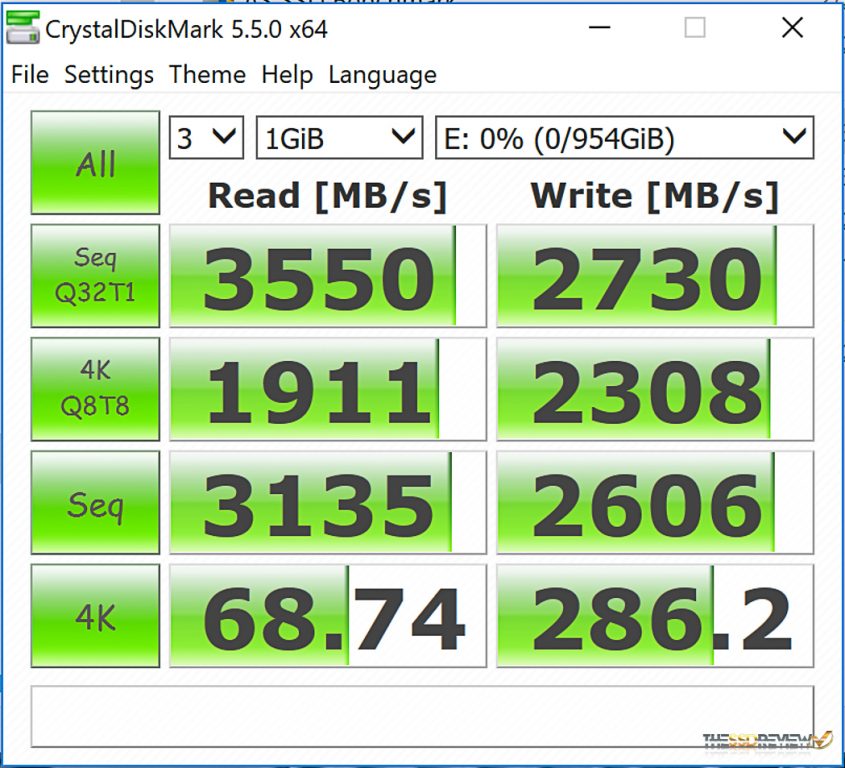CRYSTAL DISK BENCHMARK VER. 5.5.0 X64
Crystal Disk Benchmark is used to measure read and write performance through sampling of random data which is, for the most part, incompressible. Performance is virtually identical, regardless of data sample so we have included only that using random data samples.
This is the best result we have ever received for an M.2 SSD. Typically, we might see performance drop just a bit with Crystal Diskmark as it relies on 100% incompressible data samples, but not here. This result shows the absolute best we have seen , not only as a whole, but in each specific testing category.
The toughest benchmark available for solid state drives is AS SSD as it relies solely on incompressible data samples when testing performance. For the most part, AS SSD tests can be considered the ‘worst case scenario’ in obtaining data transfer speeds and many enthusiasts like AS SSD for their needs. Transfer speeds are displayed on the left with IOPS results on the right.
AS SSD fell in line with CDM as it had just about the best score we had seen for an NVMe SSD, demonstrating amazing results of 457K read and 591K write IOPS. The read dips just a bit but the write IOPS of 591K were off the chart for a single SSD.
ANVIL STORAGE UTILITIES PROFESSIONAL
Anvil’s Storage Utilities (ASU) is the most complete test bed available for the solid state drive today. The benchmark displays test results for, not only throughput but also, IOPS and Disk Access Times. Not only does it have a preset SSD benchmark, but also, it has included such things as endurance testing and threaded I/O read, write and mixed tests, all of which are very simple to understand and use in our benchmark testing.
And we would only expect Anvil to follow suit with the highest performance we have seen from an M.2 SSD as well. 529K write IOPS is incredible and the Total Score of 18,821 is almost 2000 points higher than anything we have seen.
The SSD Review uses benchmark software called PCMark Vantage x64 HDD Suite to create testing scenarios that might be used in the typical user experience. There are eight tests in all and the tests performed to record the speed of data movement in MB/s to which they are then given a numerical score after all of the tests are complete. The simulations are as follows:
- Windows Defender In Use
- Streaming Data from storage in games such as Alan Wake which allows for massive worlds and riveting non-stop action
- Importing digital photos into Windows Photo Gallery
- Starting the Vista Operating System
- Home Video editing with Movie Maker which can be very time consuming
- Media Center which can handle video recording, time shifting and streaming from Windows media center to an extender such as XBox
- Cataloging a music library
- Starting applications
SAMSUNG 960 PRO NVME 1TB NVME SSD RESULTS
This Samsung 960 Pro fared well with all tests but one being over 1GB/s, and two of the results over 2GB/s. Once again…top score.
 The SSD Review The Worlds Dedicated SSD Education and Review Resource |
The SSD Review The Worlds Dedicated SSD Education and Review Resource | 


THOSE 4 K NUMBERS AIN’T CONSISTENT ,ANVIL CAN’T BE RIGGED THEREFOR 60 MBPS RANDOM READS AND 200 WRITES IS MORE TO THE REALM,IT AINT THAT QUICK,I GET 3.56 GBPS READS FROM A FLAGSHIP OEM/IBM VARIANT,CRYSTAL SOFTWARE ,THAT DON’T MEAN I OUGHT TO ASSUME IT’S THE REAL WORLD,NO?
YOU FAILED TOIMENTION SPECIFIC DRIVERS USED IN THIS UNREAL CRYSTAL BENCH TEST,NO?
The 512GB version of the Samsung 970 PRO was indeed a bargain! I snagged one for $119.99 on Newegg with promo code a few months ago. While writes aren’t as great as the 1TB version, read speeds are over 3,200MB/sec & writes over 2,600MB/sec on my ASRock Z97 Extreme6 system. Both reads & writes improved big time over the 950 PRO of the same capacity (2300/1500MB/sec).
Can’t wait for the 980 PRO, which should introduce PCIe 4.0 support!